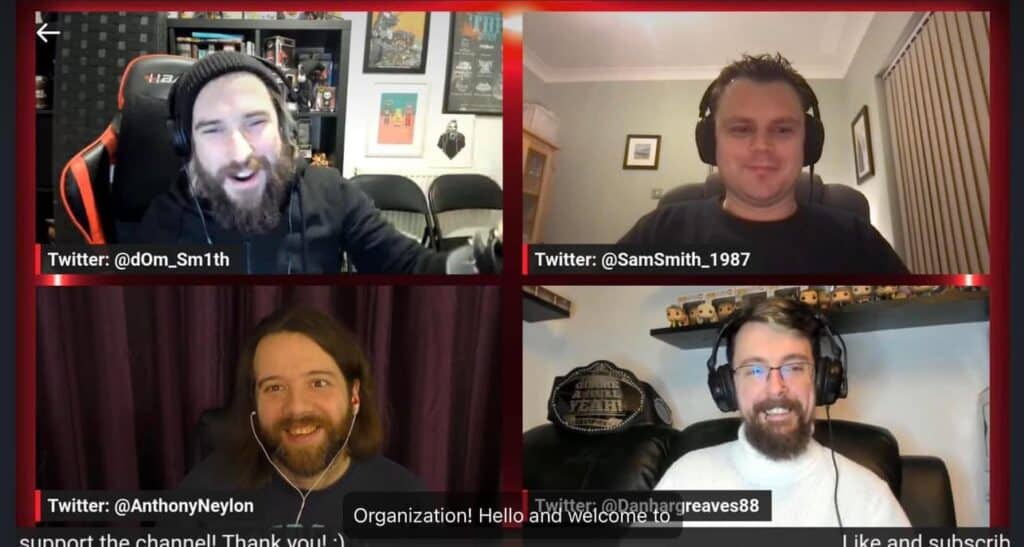Sam Smith is a Senior Games Writer for Dexerto as well as the Deputy Editor and co-founder of Wrestlesphere. Sam also co-hosts the Gimme a Hull Yeah wrestling podcast. He gave insight into his work, and advice on how to navigate the gaming journalism industry.

Sam and his Gimme a Hull Yeah podcast co-hosts.
In this Industry Spotlight interview, I had the pleasure of speaking to Sam Smith, senior gaming writer and “Elden Lord’ at popular online outlet Dexerto. During our chat we discussed several topics, including the best routes into the gaming industry for up-and-comers, as well as the increased prominence of media creation in the North of England.
Do you have an earliest memory of gaming, where you kind of thought, “this is the thing that I want to do”?
“Really, gaming was just something I enjoyed. It was almost a bit of a guilty pleasure. It was something known about me that I play a lot of games, but I was always a little bit embarrassed about it. I only really got working in in video game journalism after I got made redundant in my early 20s. I went back and did a degree in journalism, which opened a ton of doors. There’s more than one way to skin a cat, but for me, getting the degree was a massive part of it.
Then after I’d worked in journalism I went back to marketing, just because there was decent money in it in in comparison to working in a newspaper. But then I did a bit of freelance stuff in gaming and bit by bit, I did more and more, and before you know it, it was my full-time job.
It’s lovely to be able to wake up in the morning and just go “I love my job.” I love the people I work with; I love what I do. Like today I got write about the Fallout TV show and the Elden Ring DLC for my job, so I do love it.”
How did you come to work for Dexerto in particular? Because they’re the “big dogs” as far as social media and gaming news is concerned.
“When I first had my interview there, I thought “there’s no way I’m getting that job.” Obviously, you’ve got people at IGN, GameSpot, and Eurogamer who were on that top rung, and I feel like we in recent years have reached that top rung too. Sometimes, part of my job is sitting down for hours and playing a game for guides and reviews, so that’s a great privilege.
When I had my interview, they were very kind of focused on influencers and live service games. I’m the sort of guy who likes Resident Evil, Final Fantasy, Dark Souls. I’m really an old school, single player games kind of guy. So, I thought “I’m not the guy they’re looking for”, but believe it or not, they were looking for people like me. They wanted to build the gaming division to be a little bit more traditional to compete with the likes of IGN and Eurogamer.
I realised they were building a team of people like me, so I slotted in like a glove. I became the Elden Ring guy. We joke that I’m the “Elden Lord”, which might just be a comment on my age, I don’t know. Don’t get me wrong, we still do influencer stuff and all that, but I’m not anywhere near that. I’m in my own little kind of corner doing the more traditional gaming stuff, and I couldn’t be happier.
Culture connected to gaming and things like that will always be the company’s primary identity, but that doesn’t mean that we’re not building the traditional gaming stuff alongside that. When I started, that was quite niche on the site. Now me and this team have kind of geared a good portion of the site around the gaming stuff, and I now feel like we can compete with any of the other big dogs. I think we put more detail into our guides, our reviews, things like that. I’m excited to see where we’ll be next year with the gaming side.”
Because Dexerto is an America centric company, did being from the North of England impact the way that you write?
“My northern identity is a big part of my gimmick as a writer. I like to sometimes write features from the point of view of a grumpy Lancastrian. So, I think it’s impacted my voice as a journalist. But you can’t say things like “ee, by gum”, because you’ve you are writing for an American audience primarily. When I write features, I can put more of my personality into that.
It’s not a barrier being from the North of England. You don’t need to be from London. You don’t need to be from LA or places like that.”
You talked earlier about Dexerto putting more effort and more care into the reviews. It seems like gaming journalism can sometimes get a bit of a bad rap, with the Cuphead tutorial debacle, or “7 out of 10, too much water” and all that stuff. Is it important to you to uphold the dignity of the sector?
“Yeah, hugely. I’ve had conversations with people where they go “When are you gonna do real journalism?” In their heads you’re not a real journalist until you’re writing in a newspaper. So, I’ll say to them “You want me to take a pay cut? You want me to go and work for my local paper? Work way more hours for a lot less money? For a lot more stress doing something I don’t enjoy as much, is that your advice to me?”
They all think we don’t get paid properly because there’s a lot of predatory websites out there. Some websites don’t want to pay game writers properly. They’ll try and pay you by click. My advice to anybody aspiring to get into the gaming industry is to build a bit of a portfolio, get your name out there, get your name on some of these sites, but ultimately, aspire for more, and you will find it. Don’t let them use you.”
Do you think that gaming journalism is an industry that thrives on fresh talent coming through?
“Fresh people break into this industry all the time. I work with people who are in their early 20s who’ve just graduated school or uni. Within a couple of years, they’ve been a senior writer. A couple of years after that, they’ve been a junior editor. There are new opportunities being developed all the time, and as journalism evolves to become more digital, I think there’s more jobs than ever before.
The industry’s taken a little bit of a hit with redundancies and things like that, but that’s the same for most industries. There is boom and bust. One piece of advice I could give my aspiring journalists is don’t eve work for free for too long once you’re an adult out of uni. I can’t stress that enough. Check out sites like hitmarker.net and places like that because that’s where a lot of gaming jobs are. It’s where I found mine.
If you’re somebody who is in university right now doing a media or journalism degree and you think you fancy your chances at being a video game journalist? Then I’ve got good news for you: you are in the top percentage of people likely to become the next generation of video game journalist. If you’ve got a passion and willingness to work hard, you being on that course and having that interest are the two key ingredients you need.”
I wondered if you thought whether gaming journalism should become a module of journalism courses just to give people kind of a taste of what that is like?
“I don’t know, because it’s a big industry and it’s certainly growing. If you have modules about gaming, then you might need more modules about music and about TV and and all the other various arts. So, I don’t really know the answer to that. I certainly think it should be treated as a legitimate career path, because it is. Me and many of my colleagues are living proof.
I think if you are keen on writing, learn about SEO, learn about WordPress, learn about that sort of stuff because I’ll tell you now, in job interviews that is what they’re going to want to know about. They’re going to want to make sure that you are up on that stuff. Then they know they can let you loose on their WordPress, you could write an article and it be fully SEO’d, so it would be the sort of article that could go to the top of Google straight away. You will go to the top of the queue if you can not only say that and say the right make the right noises, but then back it up.
It’s useful to develop a niche, too. Like I said, I’m the Elden Lord because I was the one who reviewed Elden Ring. If you’re the guy who plays Japanese RPGs, make that your niche. If you’re the sports guy, make that your niche. If you can be the guy who’s got authority in a certain area of gaming, make it an area you love because you’ll do the best work over the games and the genres you love.”
One last question for you: In maybe the past 5-10 years or so, we’ve seen more production companies and media companies popping up in the North and having more of a firm basis in the North. You’ve got Wise Owl Productions, and obviously Channel 4 has a strong basis in Leeds. It feels like the North is on its way to becoming a real media powerhouse. What do you see as the positives of that potential shift?
“I’ve always said this, there’s just as many talented people in the north of England as there are in the South of England. If you want to work in banking and you must move down South, then OK, that’s the life you’ve chosen. With journalism, it used to be the case that you worked at your local paper, and if you were good enough or lucky enough, you were to work on Fleet Street. If you still want to do that, be my guest, but that wasn’t for me. I want to be at home, surrounded by my dogs, having a cup of tea, writing different stories every day about the games I love.
The pandemic changed a lot because it showed the world that you can work at home, and particularly in our industry it hasn’t held us back in any way. It means we can be this spider web of talent all over the world.
There’s always been potential in the North of England. If anybody tells you there hasn’t been, they’re lying to you because they don’t want that to be the case. I feel like in terms of multimedia companies and production and the arts, it’s only going to get bigger, it’s only going to grow. We’re living in a renaissance, in my opinion.”
If you have any questions for Sam, you can reach him on Twitter @SamSmith_1987. You can also check out his work here: Sam Smith – Dexerto




